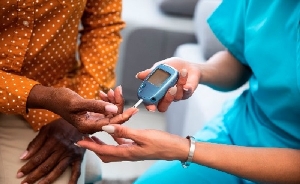Opinions of Wednesday, 10 April 2024
Columnist: Dr. Edward O. Amporful
Diabetes - A global health burden
Diabetes is a huge global health challenge. I will be using materials from the websites of the World Health Organization (WHO) and the International Diabetes Federation (IDF).
The first WHO Global Report on Diabetes was launched on World Health Day, April 7, 2016, and was dedicated to diabetes. Diabetes is a chronic illness characterised by elevated levels of blood glucose, accompanied by a disturbed metabolism of fats and proteins. Blood glucose rises because it cannot be metabolised in the cells due to a lack of insulin production by the pancreas or the inability of the cells to effectively use the insulin that is being produced.
There are three major types of diabetes: (1) Type 1, in which the pancreas does not produce insulin; (b) Type 2, in which the body cells are resistant to the action of insulin that is being produced, and over time the production of insulin progressively decreases; and (c) gestational diabetes, which occurs in pregnancy and can cause some complications during the pregnancy and at birth and increases the risk of type 2 diabetes in the mother and obesity in the offspring. Glucose intolerance, impaired fasting glucose (IFG), and impaired fasting glycemia (IGT) are intermediate conditions between normal and diabetic blood glucose levels. People with IFG and IGT are at increased risk of cardiovascular disease (CVD) than people with normal blood glucose values.
The number of people with diabetes has increased from 180 million in 1980 to 422 million in 2014. According to the IDF, there are now about 537 million adults living with diabetes worldwide—a rise of 16 percent (74 million) since the previous IDF estimates in 2019. One in 10 (10.5 percent) adults around the world are currently living with diabetes. The total number is predicted to rise to 643 million (11.3 percent) by 2030 and to 783 million (12.2 percent) by 2045. An estimated 44.7 percent of adults living with diabetes (240 million people) are undiagnosed. Over 4 in 5 (81 percent) of these people live in low- and middle-income countries. Diabetes was responsible for an estimated USD 966 billion in global health expenditure in 2021. This represents a 316 percent increase over the last 15 years.
Deaths:
About 6.7 million adults are estimated to have died due to diabetes or its complications in 2021. That’s more than one in 10 (12.2 percent) of global deaths from all causes. Five hundred and forty-one million adults, or 10.6 percent of adults worldwide, have impaired glucose tolerance (IGT), placing them at high risk of developing Type 2 diabetes. The prevalence of diabetes has risen faster in low- and middle-income countries.
In 2014, 8.5 percent of adults aged 18 years and older had diabetes. In 2019, diabetes was the direct cause of 1.5 million deaths, and 48 percent of all deaths due to diabetes occurred before the age of 70. Another 460,000 kidney disease deaths were caused by diabetes, and raised blood glucose causes around 20 percent of cardiovascular deaths (1).
The most common is Type 2 diabetes (over 90 percent), usually in adults, which occurs when the body becomes resistant to insulin or does not make enough insulin. In the past three decades, the prevalence of type 2 diabetes has risen dramatically in countries of all income levels. Uncontrolled diabetes leads to complications in many organs. Damage to small and large blood vessels and nerves leads to loss of vision and kidney function, heart attacks, strokes, and lower limb amputations. Diabetes causes disability and shortens lives.
In Ghana, about 2.4 million people are living with diabetes, and approximately 7.5 percent of adults have type 2 diabetes. Despite the alarming prevalence of diabetes in Ghana, many people may still not have been diagnosed, and there are fears the numbers may be higher. The Government of Ghana, with support from the World Health Organization (WHO) and other partners, has stepped up the fight against diabetes. In May 2022, Ghana joined other WHO Member States to set global targets for diabetes as part of recommendations to strengthen and monitor diabetes responses within national non-communicable disease (NCD) programmes.
The WHO, Ghana’s Ministry of Health, and the World Diabetes Foundation have agreed to develop and implement a joint integrated project in Ghana and Uganda. This intervention is consistent with the WHO Global Diabetes Compact, which aims to reduce the negative impacts of the disease and ensure that everyone living with diabetes has access to equitable, comprehensive, affordable, and quality treatment and care. Key aspects of the fight against diabetes are the emphasis on a good diet and healthy living.
The risk factors for diabetes include family history (parent, brother, or sister), age 40 or older, prediabetes, overweight, race (black or Latino), gestational diabetes, physical inactivity, high blood pressure, high cholesterol (lipid) levels, smoking, an unhealthy diet, non-alcoholic fatty liver disease, alcohol, and stress.
Lifestyle changes:
One can prevent or delay Type 2 diabetes with proven lifestyle changes. These include losing weight if you are overweight, eating a healthy diet, and getting regular physical activity. Dietary polyphenols prevent and manage Type 2 diabetes mellitus via insulin-dependent approaches, for instance, protection of pancreatic islet β-cell, reduction of β-cell apoptosis, promotion of β-cell proliferation, reduction of oxidative stress, activation of insulin signalling, and stimulation of pancreas to secrete insulin. Insulin-independent approaches include inhibition of glucose absorption, inhibition of digestive enzymes, regulation of intestinal microbiota, modification of inflammation response, and inhibition of the formation of advanced glycation end products.
Moreover, dietary polyphenols reduce the risk of diabetic complications, such as vascular dysfunction, nephropathy, retinopathy, neuropathy, and cardiomyopathy (Dietary polyphenols as antidiabetic agents: Advances and opportunities, Food Frontiers, 2020; 1:18–44). Cocoa is an excellent source of polyphenols. Regular consumption of polyphenol-rich foods reduces the risk of diabetes and complications.













